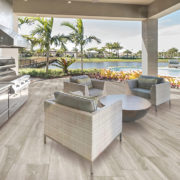Get to Know Your Flooring: Engineered Hardwood
Along with its practicality and durability, Hardwood’s iconic look makes it one of the most valuable and desirable flooring products in the world. But with the corroding effects of moisture-prone climates, bringing its charm into every home hasn’t always been simple. Today, engineered hardwood goes beyond the limitations of solid plank wood, making it possible to implement both the beauty and long-lasting value of wood flooring just about anywhere.
Making Wood Accessible
Whether your ground floor is built on a concrete slab or you wish to install hardwood flooring in your basement, engineered hardwood makes it possible. Even more, engineered hardwood is far more flexible, less expensive and much easier to install than traditional wood. Engineered hardwood is specifically designed to reduce the wood’s rate of natural expansion and contraction, offering protection from the elements in regions with difficult, humid weather. While wood can never be impervious to water, engineered wood floors are significantly more resistant to moisture than the alternative, allowing for below-grade applications and offering greater, continued stability than solid wood is able to provide in such environments.
How Engineered Wood Behaves
Engineered hardwood behaves differently from solid wood. Though made of 100% wood product, the engineered plank consists of several layers. The top veneer is the desired wood type while the remaining layers consist of plywood and unfinished white wood. The greater the thickness of the veneer (and overall plank) the more expensive the wood will be. The key to getting the most out of your engineered hardwood flooring is to be aware of how the material will fit and interact within your project’s setting. Top quality should be priority for high traffic environments.
The Benefits of Engineered
Engineered wood can be inexpensive but as with most things, paying a little extra for quality can go a long way. Top quality engineered hardwood has a thick top layer veneer that gives you the same reassurance of solid wood and saves you money over the long term, allowing you to refinish your floors more often over time. From exotic Brazilian Cherry to American Ash and Oak, there are no limitations to the species and grade of engineered hardwood products available so feel free to explore. And perhaps best of all, top quality engineered hardwood is virtually indistinguishable from solid wood and with proper care it will last a lifetime.
This post was written by Thais Sousa. Follow Thais on Google.











